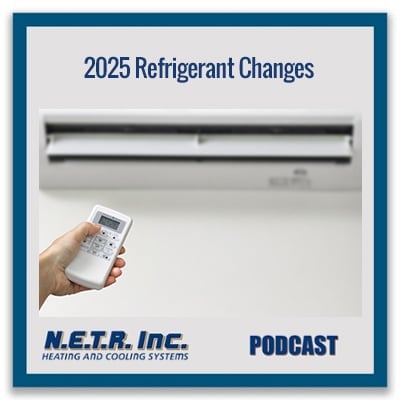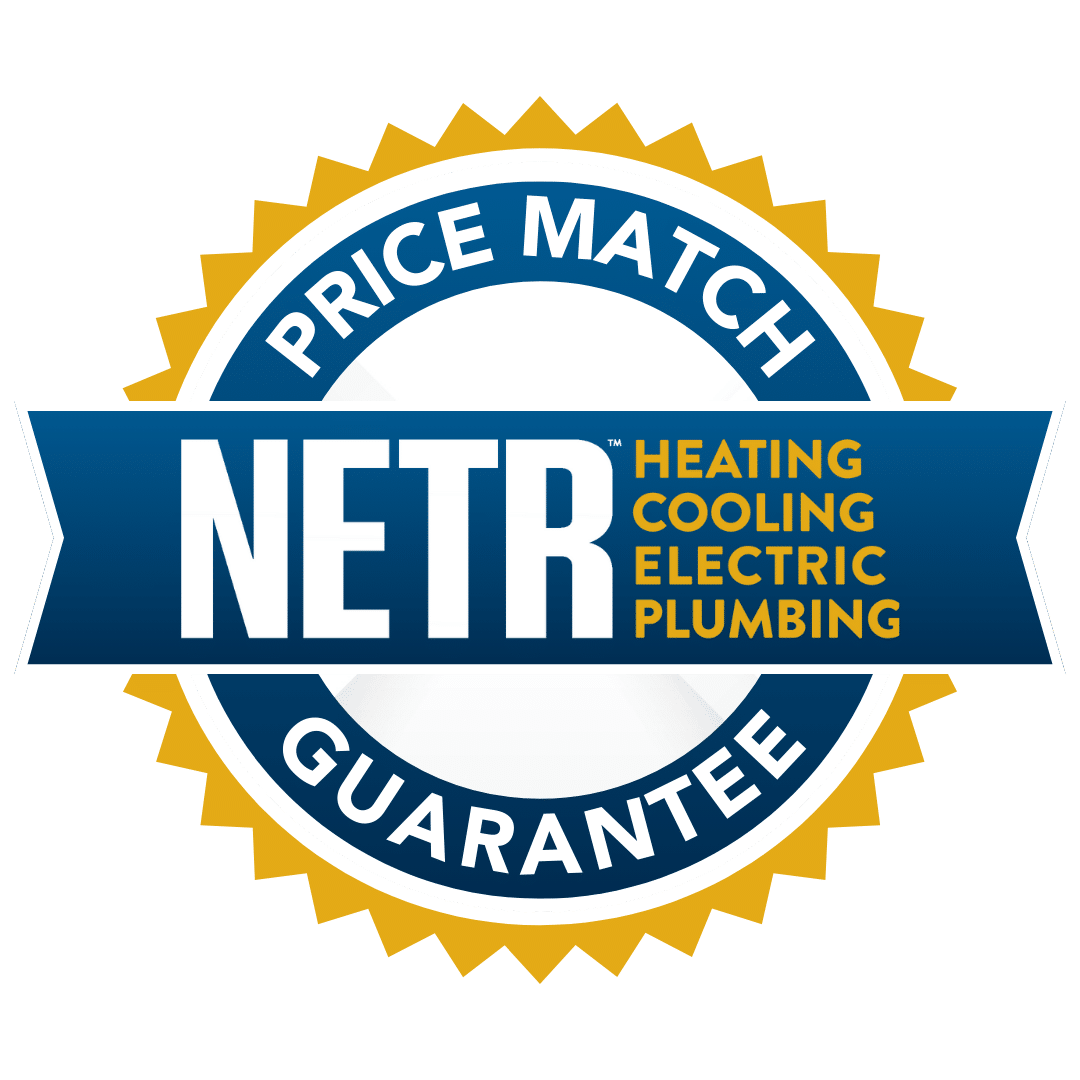
In this episode, John Maher speaks with Jesse Corso, a comfort consultant at N.E.T.R., about the significant refrigerant changes coming in 2025. They discuss the EPA’s phase-out of R-410A due to environmental concerns, the introduction of new refrigerants like R-454B and R-32, and what these shifts mean for homeowners and HVAC contractors. Jesse explains the performance, cost, and safety considerations of the new systems, offers advice on whether to buy now or wait, and highlights the contractor’s role in staying compliant with evolving regulations.
John Maher: Hi, I’m John Maher and I’m here today with Jesse Corso, comfort consultant with N.E.T.R., a heating and cooling company in Massachusetts with a focus on ductless heating and cooling products. Today we’re talking about the 2025 refrigerant changes. Welcome, Jesse.
Jesse Corso: Hi, John. Thanks for having me. How are you?
What Regulatory Changes are Taking Effect in 2025?
Maher: Sure. Fine, thanks. So Jesse, what major regulatory changes are taking effect in 2025 regarding refrigerants? How will they impact the HVAC contractors who are installing systems and also homeowners alike?
Corso: So, in 2025, the EPA has begun to phase out what was previously the standard refrigerant for residential heating and cooling. Or residential air conditioning and heat pumps. It was R-410A, that’s been the standard now for a few years, for many years. They have begun the phase-out process of R-410A, just due to its global warming potential if it were to leak out into the environment. They’re moving to, two examples, R-454B and, I believe it’s, R-32.
Maher: Right.
Corso: Which have lower global warming potential for the environment if it was to leak out of an air conditioning or heat pump system. After the first of the year, in 2025, manufacturers were not allowed to import any more R-410A equipment into the United States. We can sell off our inventory that we have in the States currently, and then after that’s gone we have to switch over to the new stuff, to R-454B or R-32. Depending on what manufacturer you end up using, the.. Some are using one and some are using the other refrigerant for various reasons.
Is There a Limit to Selling Existing R-410A?
Maher: Right. So the equipment that you have that’s currently on 410A, you said you’re able to still continually sell that. Is there a limit? Does it have to be sold within 2025?
Corso: Yes. I believe that manufacturers can sell their 410A inventory for the remainder of this year-
Maher: Okay.
Corso: For 2025. Once they’re out of that they have to switch over. So, we are already starting to see certain manufacturers having holes in their product line where they’re already sold out of some types of R-410A equipment and they’re already changing over to the new stuff. Other manufacturers maybe had a larger 410A inventory, so they’re still full product line in R-410A. Others have … We’re are starting to see holes in the product line.
How Does The Performance Of New Refrigerants Compare to Old?
Maher: With the new more eco-friendly refrigerants entering the market, how does their performance and cost compare to the previous options?
Corso: From what I’ve seen so far with different manufacturer trainings on the new stuff, performance is very similar. Efficiency ratings are going to be very similar. The cost of the equipment is going to be slightly more expensive. Reason being the new refrigerant is considered slightly flammable so the new equipment needs to have refrigerant leak detection and safeties built into it to protect against a refrigerant leak maybe inside a small area of the home where you could have a potential for a high concentration of refrigerant if it were to leak out.
Those equipment prices are going to be increased slightly because of the extra required safeties for the new refrigerant.
How Can People Proactively Prepare for Refrigerant Changes?
Maher: How can homeowners and businesses proactively prepare for these refrigerant changes? Should they be getting the new equipment? Should they be buying the old equipment because it’s less expensive now? Will they still be able to get the old R-410A refrigerant in the future if they go and purchase the older equipment now?
Corso: Those are all great questions. At this point, I wouldn’t shy away from either one. Either 410A or 454 or R-32, I wouldn’t shy away from any of that. If you can still get the 410A, save a little bit of money on the equipment then I would do that. I’m currently doing that actually in my own home. If what you need is not in stock in 410A, don’t be scared to go to the new stuff.
Buy the equipment that’s going to suit you, your home, and your home’s needs better, not just what refrigerant you want. And if you do get the R-410A refrigerant, manufacturers are still going to be able to make parts, they’re going to be able to honor manufacturer’s warranties. The refrigerant is going to be able to be available at supply houses. It’ll be recycled or refurbished R-410A eventually but it’s still going to be cycling out there in the HVAC industry. You’ll still be able to make repairs, especially warranty repairs on the 410A equipment.
All 410A Warranties will be Honored
Maher: Right. So there’s really no risk in getting the old style and then … You’re not going to have any situation where, oh, five years from now they … You can’t get 410A in the United States or something like that. They’re going to honor, like you said, all of those warranties. And the refrigerant will still be available.
Corso: Right. It’ll still be available. Manufacturers have to honor their manufacturer’s warranties for parts and things of that nature, you’re just not allowed to sell a complete system. You can sell parts moving forward here but you can’t sell a complete R-410A system. R-22 refrigerant, even before 410A, has been phased out for a long, long time. You’re going to pay a little bit of money, but you can still go to the supply house even today and get R-22 if you needed it for an older, older system.
What Role do HVAC Contractors Play in Complying with New Regulations?
Maher: Okay. What role do HVAC contractors play in ensuring compliance with these new regulations? And how do you stay informed about all of the evolving standards in the industry?
Corso: So N.E.T.R. has set brands we stick with, and we install, and we sell. Obviously, we get countless trainings throughout the year on … With those manufacturers, they’re letting us know what they’re doing particularly. It’s our job to get the training, get the certifications, and tools that are needed to put in the new R-454B or R-32 equipment.
That’s going to be a special set of gauges, it’s going to be knowing how to install the leak detection, safety devices required for the new equipment. That’s our job, making sure we know the ins and outs of the … Of how to install the new stuff and having the tools and training necessary to install the new stuff.
Maher: All right. Well, that’s really interesting. And great to talk to you about this, Jesse, thanks again.
Corso: Thanks, John.
Maher: And for more information you can visit the N.E.T.R. website at netrinc.com or call 781-933-NETR. That’s 781-933-6387.

